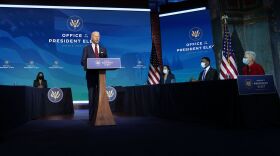Updated at 8:35 p.m. ET
White House press secretary Jen Psaki told reporters that President Biden has signed 15 executive actions, part of a flurry of steps he plans to take in the coming days to address his top policy priorities — and to roll back some of former President Donald Trump's initiatives.
White House officials had originally told reporters there would be 17 actions signed, focused on addressing the COVID-19 crisis, the economy, racial justice and climate change.
The signed actions include a mandate for masks on federal property, an action to rejoin the Paris climate agreement, a removal of Trump's travel ban affecting Muslim-majority nations, a proclamation halting further funding or construction to the wall along the U.S. Southern border, and an order reversing Trump's decision to withdraw from the World Health Organization.
"This will strengthen our own efforts to get the pandemic under control by improving global health," Psaki said during her first White House press briefing Wednesday night.
She added that Dr. Anthony Fauci, the nation's top infectious disease expert, will participate remotely in an executive board meeting of the WHO on Thursday.
On climate change, Biden revoked the permit for the Keystone XL oil pipeline from Canada, which has been vehemently opposed by environmentalists for years.
Psaki announced that Biden asked agencies to extend nationwide moratoriums on evictions and foreclosures, and the Department of Education to extend the pause on student loan payments and interest.
She also announced that the White House has sent an immigration bill to Congress.
"The president's priority reflected in the bill [is] to responsibly manage the border, keep families together, grow our economy, address the root causes of migration from Central America, and ensure that America can remain a refuge for those fleeing [persecution]," she said.
White House officials have said the actions signed Wednesday are just the first of many to come over the next several weeks.
"No time to start like today," Biden told reporters in the Oval Office on Wednesday afternoon as he signed the first three actions.
"We have a long way to go," he said, adding he'll need to work with Congress on top priorities.
The use of executive actions has become more common in recent presidencies, with major legislation often stalled by congressional gridlock. But the actions can often be fodder for lawsuits and criticism from political opponents — and can be more easily overturned by future administrations.
In her briefing, Psaki told reporters Biden will have his first call with a foreign leader on Friday, when he plans to speak with Canadian Prime Minister Justin Trudeau.
Top of mind for the Biden administration is advancing a $1.9 trillion COVID-19 relief package with Congress, something the president has already been discussing with lawmakers.
Psaki said Biden prefers to move forward with a bipartisan bill, noting that could require some changes from the initial package. She did not, however, rule out using the budget reconciliation process to advance the measures.
Below is a partial list of Biden's planned actions:
Copyright 2021 NPR. To see more, visit https://www.npr.org. 9(MDA3MzEzNjc2MDEzMDI2Mzc4OTc4NTFmNg001))












